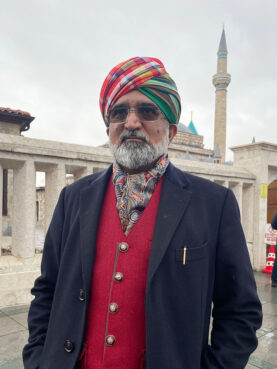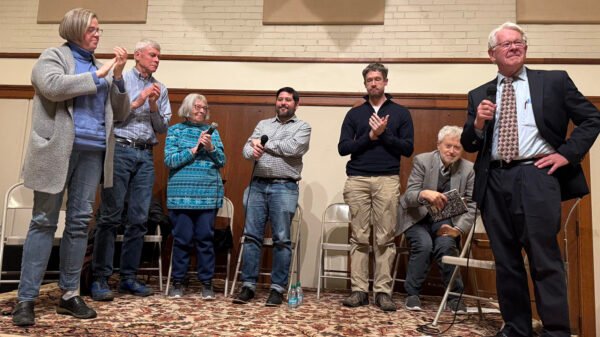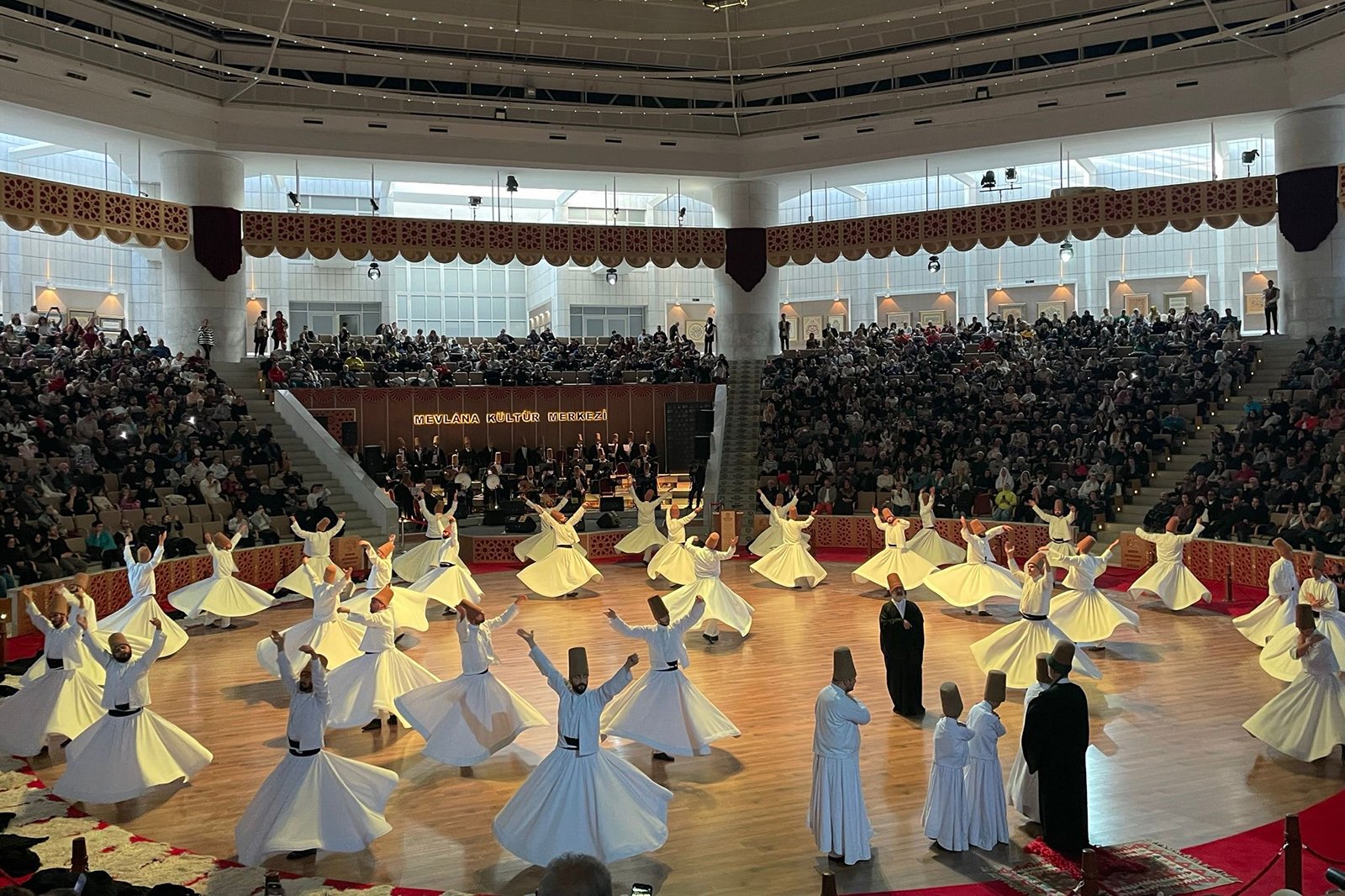KONYA, Turkey (RNS) — “Come, come, whoever you’re. Wanderer, worshiper, lover of leaving. It doesn’t matter. Ours shouldn’t be a caravan of despair.”
These phrases, belonging to the Twelfth-century poet and Sufi Muslim mystic Jalāl al-Dīn Muḥammad Balkhi Rūmī, resonated with the pilgrims gathered at his remaining resting place in Turkey to have a good time the Şeb-i-Arus — Rumi’s union with the divine — on the 751st anniversary of his loss of life.
The ten days of occasions that ended Tuesday (Dec. 17) drew lots of from around the globe to this provincial capital in central Anatolia, which in Rumi’s day served because the capital of the Seljuk Sultanate of Rum, a precursor to the Ottoman Empire.
Konya is also referred to as the house of the Mevlevi order, the Sufi sect that follows the teachings of Rumi, usually referred to as whirling dervishes, as a consequence of their distinctive spinning prayer referred to as Sema.

Ismail Fenter. (Picture courtesy Ismail Fenter)
As soon as a extra intimate affair confined to members of the Mevlevi order, Şeb-i-Arus has turn out to be one thing of a pageant, with 10 days of occasions, concert events and lectures round Rumi’s tomb, with twice-daily Sema ceremonies.
“Individuals come right here from different international locations eager to be close to Rumi, to get that factor everyone feels, and everyone feels it,” stated Ismail Fenter, an American-born Mevlevi who settled in Konya a number of years in the past.
Right this moment Rumi’s main work, the Masnavi, is learn in Islamic communities worldwide, however Muslims are hardly the one pilgrims to Konya for Şeb-i-Arus. “Individuals from in every single place get collectively right here, from all components of life, they usually have one factor in frequent, and that one factor is (Rumi) and his classes,” Soheila Adelipour, who lives in Los Angeles, informed Faith Information Service. “They are saying that (Rumi) requests you, invitations you, calls for you. In case you don’t have that request you aren’t going to finish up right here.”
Adelipour, an Iranian-born Jew and self-help creator, stated Rumi’s knowledge had helped her at tough factors in her life, including that she was hopeful that in Konya she would discover inspiration to complete her subsequent e book.
Three-quarters of a millenium after his loss of life, Rumi constantly ranks among the many bestselling poets in the US, boosting curiosity within the anniversary celebrations in Konya.
“Some individuals see that the music is gorgeous. So they arrive, after which they’re influenced by the music. Some others, they arrive for the Sema. Sema shouldn’t be a dance, however they see it as a dance. Then they search. After which the others, they arrive for the poetry,” defined Celal Çelebi, a Twenty third-generation descendent of Rumi and member of the household that has led the Mevlevi order in Konya for hundreds of years.
“Rumi’s message is common,” stated Çelebi. “Once you have a look at the tales within the Masnavi, he’s really speaking about right now — these are nonetheless frequent issues that we face each day.”

Mobeen Dervesh in Konya, Turkey. (Picture by David I. Klein)
Marek Prochazka, who got here to Konya from the Czech Republic, referred to as Şeb-i-Arus “a world tour of spirituality and wellness,” evaluating it to different non secular festivals in Hinduism and Indigenous American faiths. “Individuals go to Varanasi for the Ganga, Mexico for the Shamans, they usually come to Konya for the Sufis,” he stated.
For the various Muslims who come to Konya for Şeb-i-Arus, the widespread curiosity within the Islamic saint is some extent of pleasure. “If any person not Muslim is taking any inspiration from the saints like (Rumi), it’s. It’s an honor for Islam in itself. It’s an honor and nice information for Islam,” stated Mobeen Dervesh, who got here to Konya from the UK.
At a time when the media usually portrays Muslims as engaged in battle and extremism, Dervesh stated he believes that you will need to showcase Rumi’s message of affection and tolerance. “I believe it must be put to the individuals that there’s a love facet of Islam as nicely,” he stated, including that the religion’s Sufi sect has specific potential to deliver individuals collectively.
Fenter, who had skilled to be each a Catholic priest and, later, a rabbi earlier than adopting Islam, is engaged on a brand new English translation of the Masnavi and teaches on-line lessons on Rumi’s work.
“My college students that I’m instructing are Jews, Muslims, Christians and Buddhists. They arrive from everywhere in the world, they usually wish to be taught,” he defined. “You don’t should be Mevlevi. You don’t should be a Muslim to know what Rumi is saying.”
The Mevlevi order in Konya has inspired curiosity in Rumi and their traditions, however can be cautious that their meanings aren’t misplaced behind the fanfare of Şeb-i-Arus. The dervishes, bedecked in white robes, arms raised to the heavens as they pronounce the title of God with every rotation, have turn out to be an emblem not solely of the Mevlevi however of all of Turkey. Footage of whirling dervishes are emblazoned on vacationer tchotchkes in Istanbul’s bazaars, and dancers mimic the act at Turkish night time golf equipment.

The Çelebi household, heart, is escorted via crowds to Rumi’s tomb to supply Şeb-i-Arus prayers in Konya, Turkey, Dec. 17, 2024. (Picture by David I. Klein)
“That’s the one factor that we don’t like as a household,” stated Çelebi, whose father, Faruk, is the present chief of the order in Konya and is president of the Worldwide Mevlana Basis. “Sema shouldn’t be a dance, however a zikrullah — a remembrance of god,” defined Fenter.
Beneath the secularist insurance policies that dominated fashionable Turkey for a lot of the twentieth century, the Mevlevi order was repressed, and even outlawed within the Nineteen Twenties. Sema ceremonies and Şeb-i-Arus celebrations have been allowed once more within the Fifties to usher in tourism. In Konya, a whole stadium with seating for greater than 2,500 was constructed to host the spectacle.

Pilgrims go to the tomb of Sufi Muslim mystic Jalal al-din Muhammed Balkhi Rumi in Konya, Turkey, Dec. 15, 2024. (Picture by David I. Klein)
“This isn’t a bit of theater or dance efficiency. It’s a ritual, a spiritual ceremony, and we wish individuals to see that side and respect it,” Çelebi stated.
Nonetheless, he acknowledged that in current many years, as Rumi’s works have grown extra widespread within the West — and public faith extra distinguished in Turkey — individuals have come to deal with Sema extra respectfully.
“In comparison with 20-30 years in the past, individuals are extra respectful to the non secular a part of it,” Çelebi stated.
2024 has been fairly a 12 months. And all through it, RNS has been dedicated to shining a light-weight on how faith performs a task in so many problems with the day, from immigration to politics to schooling – whereas additionally highlighting how religion and religion leaders can unite, serve, and heal. In case you discovered one thing from this story, or from one of many lots of of different articles and opinion items we’ve revealed in 2024, will you decide to serving to us produce extra in 2025? Till midnight on December 31, each greenback you give to our nonprofit newsroom will likely be DOUBLED by beneficiant items from different readers. Thanks for visiting our web site!
Deborah Caldwell, CEO and Writer






















































